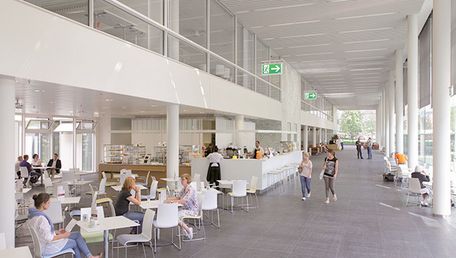Industrial medicine studies the interrelations between professional activities on the one hand and the human being and his or her health and illnesses on the other hand. Its objective is to develop preventive measures which prevent people engaged in employment from sustaining injury to health due to their working conditions. In particular, industrial medicine involves the prevention of industrial accidents, occupational diseases and other illnesses caused by working conditions.
The clinical focus of the Institute of Industrial and Social Medicine is on specific industrial-medical check-ups and assessments and the production of correlative expertises on diseases caused by allergenic or carcinogenic factors at a person’s workplace. This includes diseases of the respiratory tracts, haemopoiesis and urinary tracts, for example as caused by mould fungus, wood or flour dust, asbestos fibres, quartz dust, substances containing tar and solvents. Furthermore, general dust exposure levels and their effect on health are examined. The central task of industrial medicine is to detect and evaluate these hazards within the context of workplace inspections.
Social medicine examines the social environment of human beings. The key issue in this context relates to the share of the social environment in the emergence, prevention and treatment of illnesses. Accordingly, it is concerned not so much with the individual person but rather with groups of persons or whole groups of the overall population. As is the case with all medical disciplines, the objective of social medicine is to contribute to the protection, conservation, improvement and restoration of the population’s health. In addition, social medicine focuses both academically and practically on organisation of the public health sector and social safe
Patient care
In contrast to “curative” medicine as in the field of surgery or internal medicine, therapy for the patient is not of foreground importance for industrial medicine but rather the conservation and promotion of the workforce’s health. Industrial medicine is primarily interested in the prevention of diseases and illnesses, i.e. workplace-specific medical welfare. In this context, industrial medicine cooperates with different partners, in particular radiologists, toxicologists, cytopathologists, environmental-medical specialists and laboratory-medical specialists.
At the Institute, various state-of-the-art analysis facilities are available for the purpose of examining the functions of the lungs, the cardiovascular system, hearing and vision and for measuring stress hormones and noise levels. Individual methods include, for example, sonography, blood gas analysis, audiometry and the acoustic laboratory with its anechoic chamber.
Research and teaching
Characteristic values for functioning of the respiratory system are major diagnostic parameters. The objective of a currently ongoing research project is therefore to draw up standard values for static and dynamic lung expandability.
Various studies concentrate on sleep research. In this context, research is particularly interested in the effects of apnoea during sleep as a risk factor for workplace accidents, for example in the case of bus-drivers.
Several research projects are engaged in interdisciplinarily studying the consequences of noise stress (air-traffic / road-traffic / work noise) from different angles. Noise as a virtually omnipresent stress factor in the working world and the environment causes the occupational disease which has most frequently been subject to compensation for many decades. Furthermore, it is presumed today that noise can encourage the development of high blood pressure and cardiovascular diseases and (due to reduced ventilation with enrichment of mould fungus) pulmonary diseases.
Different experimental studies are concerned with the concrete effects of noise on humans. Thus, for example, one study is examining the extraaural consequences and risks of high-energy, very low-frequency noise (infranoise) at the biochemical level (stress hormones) and the molecular level. Furthermore, the Institute of Industrial and Social Medicine is involved in the European SVEN network project. This project investigates the psychic and physiological effect of stress caused by traffic noise under various conditions of urban planning and noise generated by individual vehicles in different traffic situations. Within the context of extensive field studies, the psychic effects (including stress hormones) of air-traffic noise on local residents living in the vicinity of airports are subject to special consideration. The Institute has its own acoustic laboratory with an anechoic chamber and various facilities for measuring psychophysiological reactions.
Furthermore, sociological methods are also applied in addition to traditional medical research methods. For example, extensive field surveys are performed at the Institute’s own telephone laboratory.
In the teaching sector, the Institute’s task is to teach medical students industrial- and social-medical aspects of the ecological subject. Students of the “Public Health” postgraduate course can attend lectures on the topics of work and environment given at the Institute. Furthermore, in cooperation with the North Rhine Academy for Further Medical Training and the Westphalia-Lippe Chamber of Doctors, the Institute offers theoretical further training for qualification as doctor in the field of industrial medicine.
Prof. Dr. med. Peter Angerer
Director of the Institute Occupational and Social Medicine
Geb. 23.11.00.66
0211 8114721
Peter.Angerer@uni-duesseldorf.de
More information
Visit this site under: Institut für Arbeits-, Sozial- und Umweltmedizin




